
Ankur Kohar
Prostate Cancer Research
‘Geographical and Temporal Distribution of Prostate Specific Antigen Testing Across Australia’
Cancer Council NSW and School of Public Health, University of Sydney, NSW
Awarded 2019
Co-funded by Rotary Club of Blacktown City, Rotary Districts 9790 and 9830
“A better understanding about geographical patterns of prostate specific antigen testing will add to the existing knowledge.”
Researcher Profile
I was born in India and completed Bachelor of Engineering Studies in 2007. Throughout the life, I was excellent at mathematics and performing related tasks. I had a passion to achieve something great using mathematical skills.
To accomplish it, I came to Australia in 2013 and did two masters degrees at the University of Wollongong and related casual work. Completing my one year research project as part of my masters motivated me to pursue further research, including a PhD.
Applying my skills in cancer research interests me because it is people focussed and provides me an opportunity to serve people.
Project Summary
Prostate cancer (PC) is the leading cancer diagnosed among Australian men. The Australian Cancer Atlas (ACA), released in 2018, showed that PC diagnosis and survival patterns vary hugely according to where men live, but it is unclear what is causing these patterns. If we can reduce some of this variation in survival we can save the lives of men with PC. The prostate-specific antigen (PSA) test has a very important role in driving incidence and survival rates by detecting cancers that may not otherwise have been detected.
In this study, I will have access to over 29 million records extracted from the Medicare Benefits Scheme relating to tests and treatment for PC. This study provides a unique opportunity to understand how testing relates to diagnosis and survival in men with PC.
I will develop statistical research methods to address the following important questions: What do the geographical patterns of PSA testing look like across Australia? Has the pattern of PSA testing in different areas of Australia changed over time? What is the impact of age on the geographical patterns and trends over time of PSA testing? What key other characteristics, including affluence or disadvantage and accessibility or remoteness, are associated with the geographical and temporal patterns in PSA testing? How are geographical patterns for PSA testing associated with patterns in PC incidence and survival?
The results of this research will be incorporated into the ACA and will help direct future initiatives to make testing for PC more effective in Australia.
Supervisors: Associate Professor David Smith, Professor Peter Baade & Dr Susanna Cramb